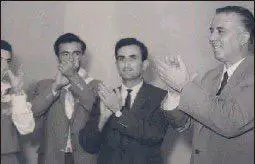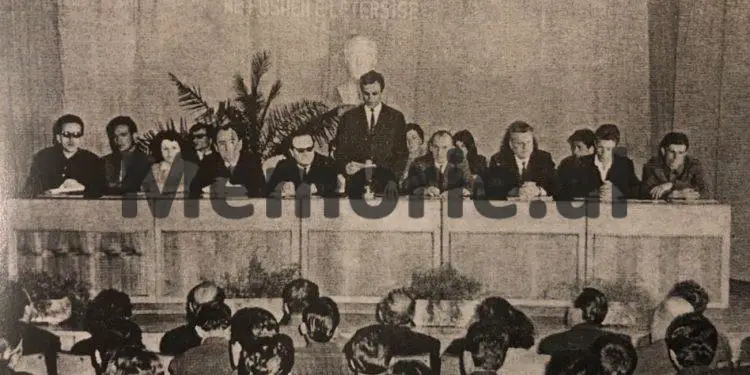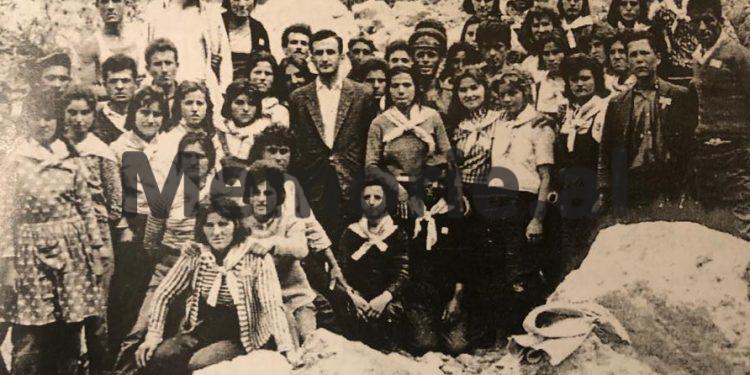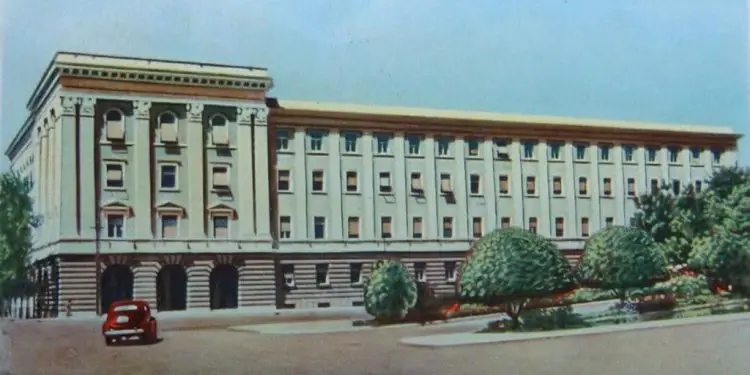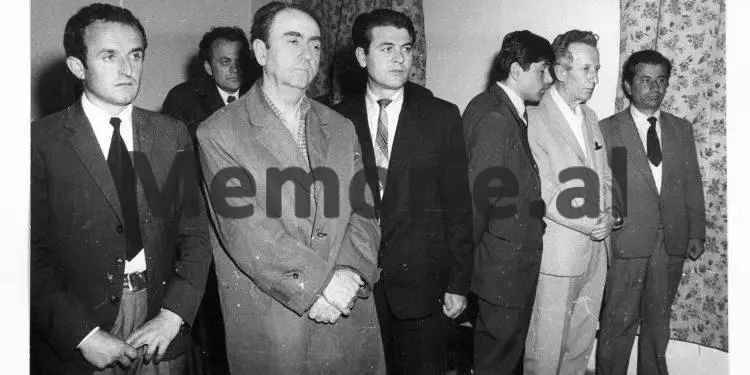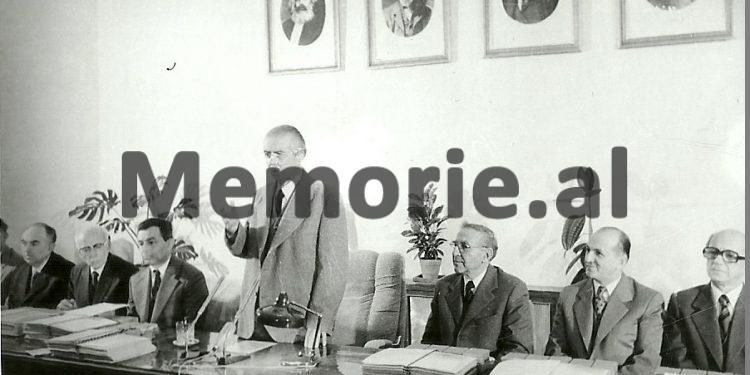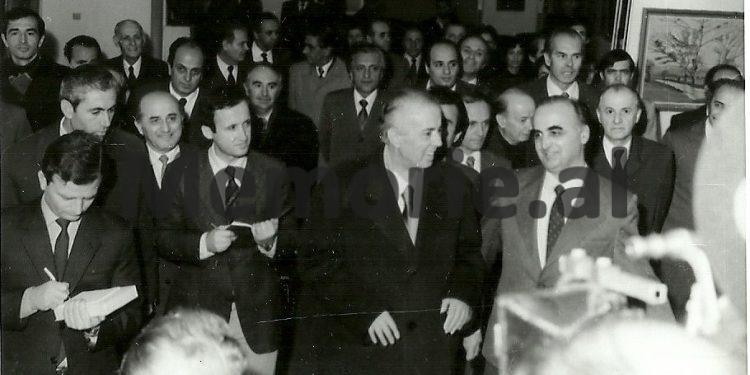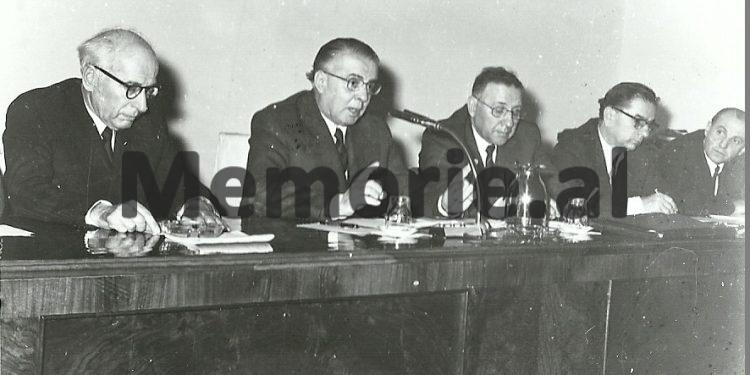Dashnor Kaloçi
Second part
Memorie.al publishes an archival document issued by the Central State Archive in Tirana (Fund of the former Central Committee of the ALP), where the discussion of Enver Hoxha held at the meeting of the Secretariat of the Central Committee of the ALP on February 23, 1973, where the main cadres of the highest forum of the organization of the Albanian Working Youth Union, chaired by Agim Mero, the first secretary of the Central Committee of the Albanian Working Youth Union, were also invited. that Enver ordered to be called urgently to that meeting. Enver Hoxha’s full speech at that meeting where he for the first time analyzed all the “problems of youth” and “its education”, with art, culture, literature, cinema, books, libraries, homes and culture, stocks, discounts, volunteer work, etc. As well as the problems that had emerged and appeared in some young people, with fashion, foreign shows, modernist influences, etc.
“I believe that there is no house of culture, where there are no different musical instruments, many of which are produced inside, are also brought from abroad, and that all together have helped a lot for the entertainment and education of the youth. In this area, there is a great development, a great progress has been made everywhere. The youth have these tools in their hands, which we see in Estrada and at festivals. This is a great pleasure, then why underestimate it? Needed even more, there is no doubt that yes, and efforts should be made for this, but to darken the issue and say that the shepherds who spend the summer in the mountains of Lenia and Gramoz do not have a radio or there is no film itself, that is to speak in the wind. Every shepherd can very well buy a radio with batteries, if he wants, because there is a day in the market and his work is bigger than the others and not to be expected that the state will do everything. Friends of the youth, you are looking for many special clubs for the youth in the cities and this, wherever possible, let it be done, but as far as I know these are also built, equipped with everything, even with billiards, yes then they closed because they departed from the purpose for which they were raised. ”
This was stated, among others, by Enver Hoxha in his speech at the meeting of the secretariat of the Central Committee of the ALP on February 23, 1973, where the main cadres of the high forum of the organization of the Youth Working Union were invited. Albania, which at that time was headed by Agim Mero. This meeting of the secretariat of the Central Committee of the ALP took place only shortly after the 11th Song Festival on Radio-Television and the speech of Enver Hoxha held on January 9 of that year in the office of the Presidium of the People’s Assembly of Albania, where he spoke for the first time against “liberal attitudes and foreign performances in art and culture” and their impact on the whole life of the country. For more about this, the document in question introduces us to the discussion of Enver Hoxha that Memorie.al publishes in full since this issue.
Followed by the last number
Discussion of Enver Hoxha in the meeting of the Secretariat of the Central Committee of the ALP, on February 23, 1973
There are not only some young people who misbehave, why there are also men, but this should not make us forget the young people, leaving the expression “Well, they are young”. Educating people is one of the biggest preoccupations we have to have and it starts in the family and continues and then plexes with school, then with work, with society. At every stage, in every environment, there are forms and ways, a whole complex for their education. It is not enough just to sell your mind in this regard, but also to buy from others, it is not enough just to ask, but also to give, to become an example, to be courageous, creative and indifferent. Therefore, youth friends, the main cultural front for youth education should consider school. To attach great importance to the acquisition of a broad and diverse culture, during the years that the youth spends in school. To look at the culture of educating the youth in a close prism, how many plays are prepared with themes about the youth, that special scientific books on the youth should be published, that novels should be written with themes only about the youth, that the Opera and Ballet Theater there is a need to prepare special ballets for the youth, etc., is not recommended. This greatly narrows the sphere of youth education, isolates it from the great opportunities that have been created for it and, ultimately, is not even real. The youth themselves do not accept this framework, it has broken it in time and has done well.
What does it mean to write special novels for youth? I do not say not to write such, beautiful and in ever-increasing numbers. The party has inspired and will continue to inspire writers in these areas as well, but that does not mean your organization stays handcuffed. There are young and talented authors, so why not specifically encourage them for this? But even by order these are not done. In addition, all our literature is about youth, why it is with socialist content, it is as fresh as youth, it describes our life, feelings, wars, pure love, the working class and its struggle, the efforts of our cooperative peasantry, with a word the development of our lives in all aspects. There is no genre of our literature that does not talk about the life, thoughts, feelings and struggle of our youth. Does this youth live apart from its parents, grandparents, friends, friends? Her life, her feelings are complex. There is no young person over 13 years old in our country who is not thirsty for novels, poems, etc., which constantly bring to light our writers and poets. How good it would be, and so it should be, to have simpler publications for the little ones, and for some young people up to a certain age to have some simpler, more understandable literary creations. Such creations should be published and we should add them. Therefore, your young people, translate and create even from these beautiful and appropriate creations and they will surely be published for you, but do not put a barricade or division of literature for the young and the literature for the elderly.
We do not live in a bourgeois regime, so all the literature we publish can and should be put without fear in the hands of the youth, because there is no corrupt morality in it, it is not a pornographic and bandit literature, but it is exactly that that educates all our people in a revolutionary way and in the path of proletarian morality. The same can be said of theater, ballet, folk dances, music, radio, and television. Everything in our country is in the service of educating the young man, everything is and generally develops in the right way. But between them there are very good parts, there are good ones, there are average ones, sometimes there are also mistakes. Even in this field there is war, there are efforts. Everything develops, the old that penetrates is fought and replaced with the new. Even the pressure of the bourgeoisie does its job, tries to find cracks, sometimes even finds, is being fought and replaced by the good, vigilance is sharpened, positive creativity takes off. Can we think for a bit that our youth is excluded from all this development, from this participation, from this creativity, from this war that is being waged in our country? By no means do I want to convey that I recommend for the mother to be inactive.
In the National Liberation War, in the most culminating moment of the difficulties and tragedy of our nation, in the most responsible moments of that time, our youth was at the forefront of the battles and its heroism will be sung as legends for centuries. Could we say in those historic moments to young men and women: “Stay at home, that war is not for you, it is for men”!? If we did so today, there would be no free socialist Albania. Our current literature, then, to whom do you sing? She sings exactly to these heroines and heroes of 18-20 years old who commanded brigades and divisions. Are there more appropriate topics for our youth than those of this heroic period? There is no. Our youth should know where all these girls and boys came out with empty bellies, bare feet, but with the heart of a lion who sacrificed their lives. This brave and warlike people of ours brought them out of their midst. Why, are not works suitable for our youth such as: “Commissar Memo” by Dritëro Agolli, “Chronicle in stone” or “The General of the Dead Army” by Ismail Kadare or “Dead River” by Jakov Xoxa and other works like these? It is neither good nor right to put unfounded walls in the sound culture of youth, but to educate, to encourage him to read, to read, and again to read, and to draw lessons from these readings. By this I do not mean that it is not read.
There is noticeable progress in this regard, but let’s not be complacent. I especially address the youth to read and study even more, because the homeland expects a lot from it. We, the elderly, feel the gaps of our knowledge, that other conditions were ours when we were young, many tragic troubles were then thrown over our heads, so we want and fight that our youth does not have gaps in knowledge, why it has all the possibilities and conditions, and the best will still have them and we will create them in the future, with work, sweat and knowledge. I would also like to tell the youth that we can and should publish even more scientific books, literary works and other publications about him. Not that something prevents us from the will to do so, but it should be known that these are the current opportunities of our state. We are building bigger and more modern printing houses than we have, and surely the time will soon come when we will print even more, but I leave it to the young men and women to judge this matter with their pure minds and consciences, that the Party has taught me to have an absolute conviction in the youth and in its fair judgment.
Have not a few published and are published artistic literature, scientific literature, literary and scientific magazines, textbooks of all subjects and categories, political, literary, scientific newspapers, lectures, special studies? Or are there few foreign books that we make available every year to our studio intelligence in various institutions, such as the National Library, the University Library, the libraries of the ministries and even those of the enterprises? We say that they are not few and I am convinced that the youth also agrees with us. Only that these should be used seriously, very seriously. There is no village across the country today without a library, let alone cities, where the library is everywhere. Are they frequented? Yes and no. We were told they needed a librarian and the state put in one with a salary. No culture was said, and people with school were put. Friends of youth complain that both libraries and houses of culture are turned into warehouses. What a bad friend! But who is to blame? Didn’t the Party say that they should be returned to the warehouse? What do you do, why do you allow them? Where are the communists, where are the young people? How can these things be allowed to resemble us in our time of socialism? Let me tell you something from the past of our youth in Gjirokastra, here 50 years ago. We, the students, with a penny that our poor parents could hardly provide for us, we had opened two clubs in the city, we had set up libraries with our very few books, we had bought some musical instruments ourselves, some mandolins and guitars, which we learned to play and go out with the people.
Keep in mind that we wiped the clubs and cleaned them ourselves. Anyone who knew a foreign language would read books and then gather us there and tell us the events. Now my hair is bleached, however I can never forget a Samuel Kofina, who all day long tired with meringue balls on his arm to sell a meter, and in the evening, even as he was tired, came to talk to us about the authors ancient Greeks like Homer, Aristophanes and sometimes for Allen Pinkerton. I cannot forget, also, Kamber Bilali, a poor man with torn pants, who worked and read during the day and in the evening came to talk to us about the novels of Aleksandër Dymas, etc., he told us in parts, in episodes. But today, how can we be allowed to do so with books, libraries, and houses of culture? Even the issue of youth entertainment, of course, we need to look at broadly and realistically. But, first of all, my opinion is that the state has not stood idly by in this regard either. He has consistently invested considerable funds and will continue to invest even then, why need.
But all that we have built and created is for the youth and it should consider its own, use them properly and take care of their maintenance and not ruin them. In addition, the initiative of the grassroots, especially the youth themselves, should be more vibrant and fruitful in this regard. So, reflect more deeply on what I said. I believe that there is no house of culture where there are no different musical instruments, many of which are produced inside, are also brought from abroad, and that all together have helped a lot for the entertainment and education of the youth. In this area, there is a great development, a great progress has been made everywhere. The youth have these tools in their hands, which we see in Estrada and at festivals. This is a great pleasure, then why underestimate it? Needed even more, there is no doubt that yes, and efforts should be made for this, but to darken the issue and say that the shepherds who spend the summer in the mountains of Lenia and Gramoz do not have a radio or there is no film itself, that is to speak in the wind. Every shepherd can very well buy a radio with batteries, if he wants, because there is a day in the market and his work is bigger than the others and not to be expected that the state will do everything. Friends of the youth, you are looking for many special clubs for the youth in the cities and this, wherever possible, let it be done, but as far as I know these are also built, equipped with everything, even with billiards, yes then they are closed because they departed from the purpose for which they arose. Make requests, but at the same time you have tasks.
Youth everywhere do many, many good things and that is its characteristic, but I have been told that the holiday home of professional unions in Voskopoja that was given to students to spend the winter school holidays, during the days they stayed there, damaged. This way you cannot walk friends, the state spends and build and harm you. So, in many places children’s playgrounds have been built, but they disappeared without a trace, once phones were put in the streets, they were broken by some messy young people. Agree that not all young people do this, no one says that, but it is young people who do such things, so the youth organization in particular has a responsibility for all these unpleasant things that happen. Do you, as youth leaders, think of the police as preserving what we build or with education? Are you aware that this educational work is to a large extent done by the youth organization itself, not to mention the great responsibility that the Party, the school, the family, the whole society have?
It should not be forgotten then that the education that is given and as it is given with its good sides and flaws, the youth should do its own thing, root the good in its character, kick the bad, in any form that appears. Why not spend the funds that have been allocated for the needs of the youth? If so, why don’t the Party and your young people make this a big deal? You can tell us that they do not listen to you and that is why you brought the matter to the Secretariat. I am not saying that you did wrong to bring the issue here and we will draw the attention of the Party and state bodies that violate or do not implement the decisions, but I also tell you that the work does not end there, it must be fought strongly at the base, especially by you, against distortions, against bureaucracy, routine and disregard.
Interest in the development of physical culture and sports is of great importance. The party has always emphasized this, measures have been taken and investments have been made, numerous theorizations have also been made and continue to be made about the way, the methods, etc. But these theories, however good they may be, do not yield much bread, unless they arouse in the youth the absolute love and necessity for the exercise on its part of physical culture.
If the youth does not understand this as an issue that is about strengthening health and not about snobbery, then, no matter how many tools are made available, there can be no physical education and sports in the youth mass. And the tools are put in place, maybe a little bit so far, but they are not used properly. We are required to open special shops in the cities for the sale of sports equipment. Stores can also be opened, but they should be filled with sports items. Not to ask for one in every city, but to open one or two at a time. We must first think rationally what is needed and how much we can do and not promise and do nothing. You tell us that the Government has decided to build different playgrounds in every village, as well as in the neighborhoods of some big cities. This is a good decision, however very bold from the alignment. But here you are telling us that a year has passed and nothing has been done to implement this decision. I would like to ask you, comrades: Have you helped the Government to do these things for you, or have you waited and are waiting for everything to come to you by train, truck and on the due date?
I believe that neither you, nor the districts, nor the enterprises have viewed this decision of the Government properly. I think that the state should definitely help in this direction, but in no way should everything be expected from the state, because you have to do a lot of things on your own initiative, companies have to do it, districts have to do it. All the possibilities are to create small sports fields in the neighborhoods of the cities, to build with the help of enterprises playgrounds for pioneers, to make excursions to picturesque places and I think it is not necessary to set up a special shop for it made alpine shoes and we are not even able to bring thousands of skis from abroad for this kind of sport that is not yet developed in our country, so let’s develop it first with primitive skiing, which young people themselves can do. It is right to criticize you teachers who do not care about the extracurricular education of children, which is an integral part of their task. Whoever understands this differently, he is wrong. Of course, this interest must be accompanied by your organization, family and society as a whole. You also rightly complain about the lack of both the number and the quality of the pioneer writings. Our writers need to reflect deeply on this lack of serious consequences. Here I give you the right, but at the same time I tell you that so many talented young people who have come out of your ranks, who know the life and feelings of pioneers, who have been like that before, what do they do? What do you do with them? How much do you influence them to specialize in this area? Does writing for the little ones seem like something easy, unimportant, without perspective, without “fame”?
That is why the Central Committee of the Party calls on our talented writers not to forget to write about both the youth and the pioneers. Literature for children is very important, very necessary and only talented and passionate people can bring out pleasant and educational creations for the most beautiful flowers of our socialist garden. You have done well to address the economic bodies and the Council of Ministers with some material on some of the main problems raised by the youth on economic issues. I am not familiar with this report of yours, but I do know a number of issues of youth in production. The opinion of the Party is that the youth stays at the forefront and works everywhere very well, this is its distinguishing feature. But even on her part, as in others, there are flaws in the work. You express the desire of the cooperative youth to work part-time and within this time to realize and exceed the plan, etc. This is a wish, but unfortunately it is not being realized even in factories, where discipline at work is greater, not to mention in agricultural cooperatives. When I say this in the factory, I speak with competence, with timing and not with conjecture. /Memorie.al
Continues tomorrow




